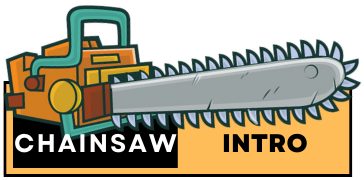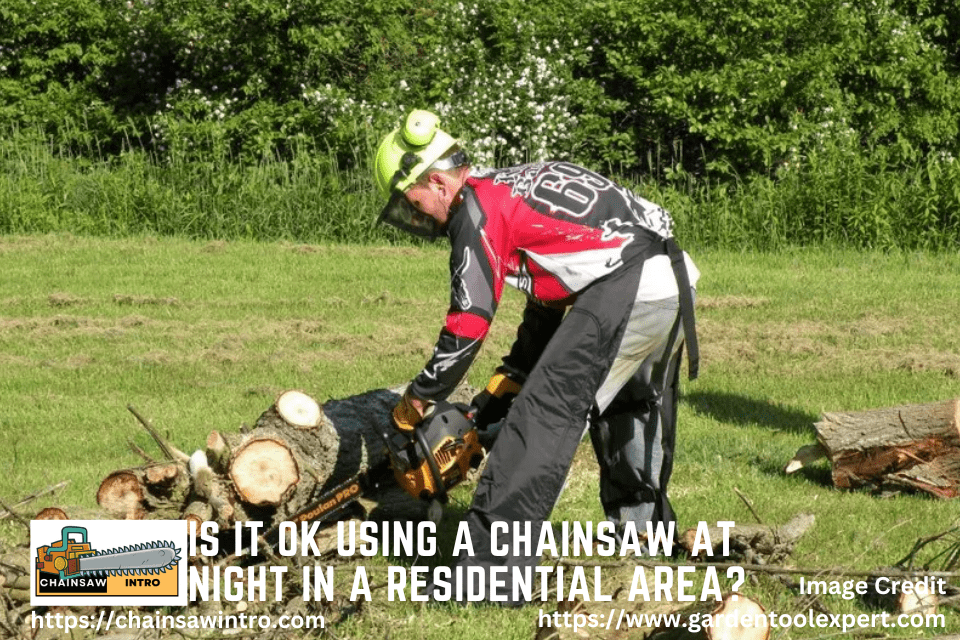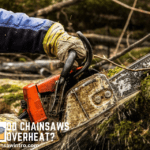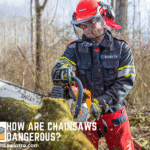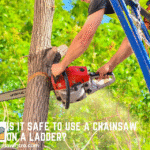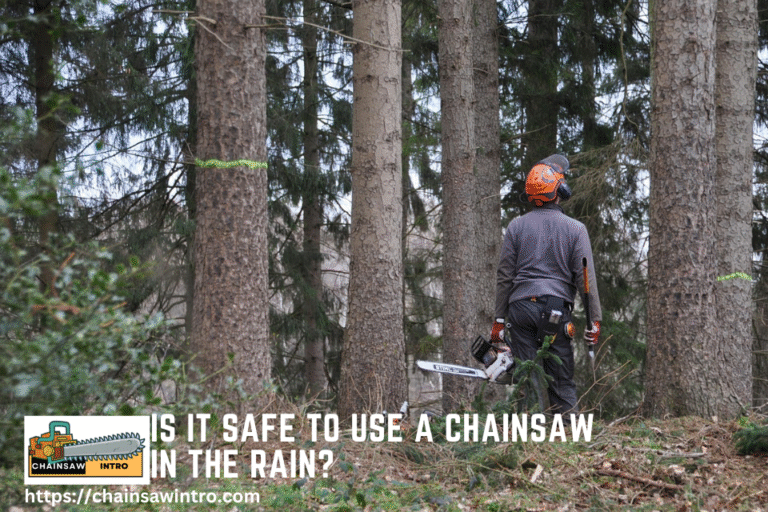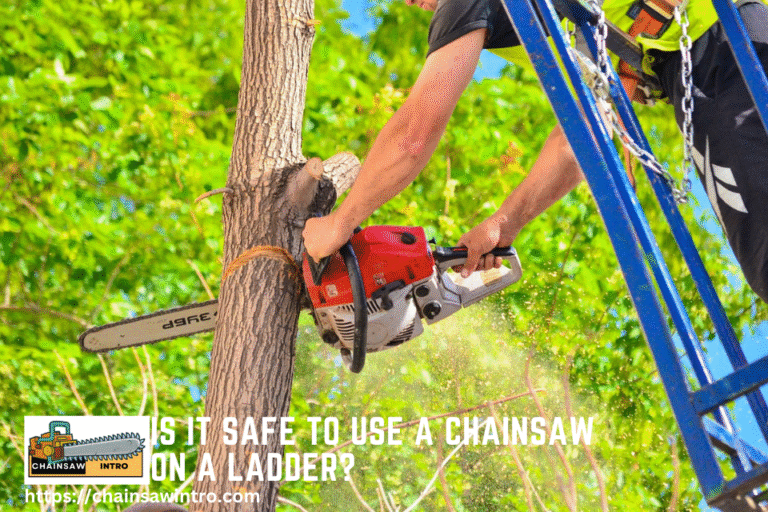Chainsaws are powerful tools for cutting firewood, trimming trees, and clearing debris. But if you’ve ever been tempted to fire one up after dark, you’ve probably wondered: Is it OK using a chainsaw at night in a residential area?
The simple answer is no, it’s usually not recommended—or even legal in many places—to use a chainsaw at night in a residential neighborhood. Between noise restrictions, safety risks, and community courtesy, using a chainsaw after dark can create problems for both you and your neighbors. Let’s break down the facts.
Noise Regulations and Chainsaws at Night
One of the biggest issues with nighttime chainsaw use is noise disturbance. Chainsaws, whether gas or electric, generate significant noise—usually between 85 and 120 decibels. For reference, that’s about as loud as a rock concert.
Most residential noise ordinances set “quiet hours” between 9:00 PM and 7:00 AM, though this can vary by city or county. Operating a chainsaw during these hours could result in:
- Complaints from neighbors
- Visits from local authorities
- Fines for noise violations
Tip: If you’re unsure about your area’s laws, check your city or county’s noise control regulations. Search for “residential noise ordinance” followed by your location.
Safety Risks of Using a Chainsaw at Night
Even if there were no laws against it, using a chainsaw at night introduces serious safety concerns. Chainsaws already rank among the most dangerous power tools, and reduced visibility makes them even riskier.
Key safety risks include:
- Poor visibility – Dim lighting makes it hard to see branches, kickback hazards, or where the chain is cutting.
- Trip hazards – Tools, cords, or uneven ground are harder to spot in low light.
- Higher chance of fatigue – Evening hours often mean you’re more tired, lowering reaction time.
- Difficulty seeing falling branches – You may not notice where cut limbs or logs are heading until it’s too late.
For these reasons, most experts recommend never using a chainsaw after dark unless it’s an absolute emergency.
Practical Tips for Safe Chainsaw Operation After Dark (If Unavoidable)
While generally not recommended, if you must use a chainsaw at night in a residential area (e.g., emergency storm cleanup), prioritize safety. First, check local laws to ensure compliance with chainsaw night use regulations. Use bright portable lights (e.g., 1,000-lumen LED floodlights) to illuminate the work area, avoiding shadows that hide hazardsk. Wear full PPE, including reflective clothing for visibility, and work with a spotter to monitor surroundings. Opt for quieter electric or battery models (85-95 dB) over gas (100-120 dB) to minimize disturbance. Take frequent breaks to combat fatigue, and never operate alone at night. Clear the area of debris first to prevent slips, and use a stable stance, per OSHA factsheets. These tips can mitigate risks, but daytime use remains the safest option.
See Also > > >What Time Can You Use a Chainsaw in the Evening?
Legal Considerations: Chainsaw Night Use Regulations in Residential Areas
In most U.S. residential areas, using a chainsaw at night is often restricted by local noise ordinances designed to maintain peace during quiet hours. As of 2025, many cities and counties enforce noise control codes that prohibit loud equipment like chainsaws outside designated times. For instance, Glen Cove, New York, updated its noise ordinance in June 2025 to allow power equipment (including chainsaws) only from 8 AM to 7 PM on weekdays and 9 AM to 4 PM on weekends, with no nighttime use permitted. Similarly, Denver’s revised ordinance effective February 27, 2025, sets quiet hours from 9 PM to 7 AM, where noise exceeding 50-55 dB (comparable to a quiet conversation) is prohibited, effectively banning chainsaws after dark. Portland, Oregon’s Title 18 Noise Control Code aims to protect public health by limiting noise in residential zones, with permissible levels dropping to 50 dB at night.
Nationally, the EPA’s Noise Control Act of 1972 promotes environments free from harmful noise, but enforcement falls to local laws. In states like Massachusetts, residential noise limits are 60 dB daytime and 50 dB nighttime, while Pinellas County, Florida, allows 72 dB from 7 AM to 11 PM but drops to quieter levels overnight. Violating these can result in fines of $50-$500, depending on the area. Always check your local municipal code or contact city hall for specific residential chainsaw hours, as regulations vary by location and can change, like Glen Cove’s 2025 updates. In short, nighttime chainsaw use is generally not OK legally in residential zones due to these restrictions aimed at preserving community tranquility.
When Might Chainsaw Use at Night Be Necessary?
There are rare situations where using a chainsaw at night could be justified:
- Storm damage – A fallen tree blocking a driveway or road may require immediate removal.
- Emergency access – If a tree is preventing someone from leaving home in a medical emergency.
- Utility hazards – A branch damaging power lines or structures might need urgent attention.
Even in these cases, it’s best to use proper lighting, wear full safety gear, and alert neighbors before starting. If the situation is severe, calling emergency services or professional tree removal companies is often safer.
Noise Impact: Residential Chainsaw Noise Limits and Etiquette
Chainsaw noise is a primary reason nighttime use is frowned upon in residential areas. Gas chainsaws produce 100-120 dB, equivalent to a rock concert, while electric models are quieter at 85-95 dB, similar to a lawnmower. Most residential noise limits drop to 50-60 dB at night (typically 10 PM to 7 AM), far below even the quietest chainsaws. For context, normal conversation is 60 dB, so a chainsaw at night can disturb sleep and violate etiquette, leading to complaints or fines.
Chainsaw etiquette in neighborhoods emphasizes daytime use during permitted hours (e.g., 8 AM-7 PM weekdays), notifying neighbors in advance, and opting for quieter electric models. In the UK, similar rules apply, with noise disturbances reported to councils. Using a chainsaw at night not only risks legal repercussions but also strains community relations, as noise carries farther in quiet evenings. If noise is a concern, consider quiet chainsaw alternatives for nighttime, like manual loppers or battery-powered pruners under 70 dB.
Alternatives to Using a Chainsaw at Night
If nighttime chainsaw use is necessary due to emergencies like fallen trees, explore alternatives to minimize risks and disturbances. Quiet chainsaw alternatives for nighttime include manual pole pruners ($20-$50) for branches up to 2 inches, which produce no noise but require more effort. Battery-powered pruners or mini chainsaws (60-70 dB) like the Worx WG323 are suitable for small limbs without waking neighbors, per our article on electric chainsaw tree cutting. For larger jobs, hire a professional arborist ($100-$300 per visit), who uses insured, high-powered equipment during daylight hours.
In non-emergencies, schedule chainsaw work during daytime permitted hours or use quieter tools like electric loppers. If visibility is the issue, invest in LED headlamps or floodlights for safer operation, but avoid night use altogether if possible. These options fulfill the intent of safe, considerate tree maintenance without violating residential chainsaw noise limits.
See Also > > > What Time Can You Use a Chainsaw in the Morning?
Conclusion | Should You Use a Chainsaw at Night?
Using a chainsaw at night in a residential area is not OK in most cases. Between noise ordinances, safety risks, and community courtesy, it’s always best to wait until daylight.
Exceptions can be made in emergency situations, but even then, proper precautions, lighting, and possibly professional help should be used.
If you’re a homeowner or DIY enthusiast, the takeaway is clear: chainsaws are daytime tools, not nighttime tools. Save your cutting jobs for safe, well-lit hours to protect yourself, your neighbors, and your community.
Frequently Asked Questions
Is it legal to use a chainsaw at night in a residential area?
In most places, residential noise ordinances restrict loud tools between 9:00 PM and 7:00 AM. Using a chainsaw during quiet hours could result in fines or complaints.
Why is using a chainsaw at night dangerous?
Nighttime chainsaw use is risky due to poor visibility, higher fatigue, and unseen hazards. It increases the chance of accidents, especially from tripping, falling branches, or kickback.
Are electric chainsaws quiet enough to use at night?
No. Even though battery chainsaws are quieter than gas models, they still produce 85–95 decibels, which exceeds acceptable noise levels for nighttime in residential neighborhoods.
Can I use a chainsaw at night during an emergency?
Yes, in cases like storm damage or blocked driveways, you may need to use a chainsaw at night. Always use bright lighting, proper safety gear, and consider calling professionals if it’s severe.
What are alternatives to using a chainsaw at night?
For smaller tasks, you can use hand saws or loppers, which are quiet and safe. For larger work, it’s best to wait until daylight to avoid legal and safety issues.
What is the noise level of a chainsaw?
The noise level of a chainsaw is typically between 90 and 110 decibels, which is considered to be very loud. This is why it is important to wear hearing protection when operating a chainsaw. It is also important to note that the exact noise level can vary depending on the type of chainsaw, the size of the chain, and the amount of power being used.
What is an Unsafe Noise Level?
It’s important to remember that high noise levels can be harmful to your hearing and health. However, the danger of loud noises goes beyond just temporary hearing loss or ringing in the ears. In fact, according to research by Harvard University, noise exposure over 85 decibels can lead to serious health problems including cardiovascular disease and stroke.
Keep in mind that these health risks are not just associated with chainsaws and other noisy tools. According to experts, the cumulative noise from cars, trucks, trains, planes and other over.
I’ve spent the past 10+ years working with chainsaws in forestry, landscaping, and firewood preparation. Along the way, I’ve gained certifications in chainsaw operation and safety and built extensive experience with trusted brands like Stihl, Husqvarna, and Oregon. I enjoy sharing my knowledge through step-by-step guides, tool reviews, and safety advice so others can get the most from their chainsaws while staying safe on every job.
